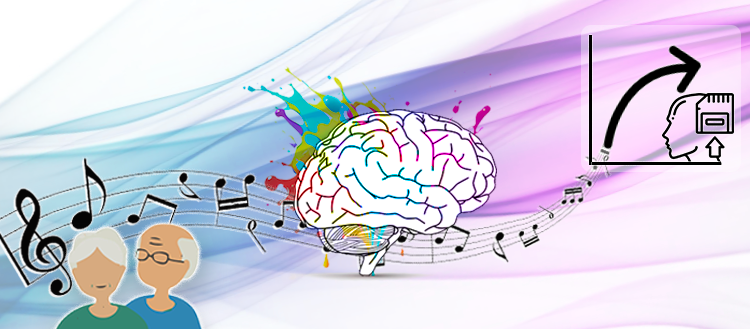How music can prevent cognitive decline
A team from UNIGE, HES-SO Geneva and EPFL shows the positive impacts of musical activities to counteract brain ageing.

Side view of a brain. In blue, the areas affected by the increase in grey matter in the elderly as a result of music practice. © UNIGE – Damien Marie
Normal ageing is associated with progressive cognitive decline. But can we train our brain to delay this process? A team from the University of Geneva (UNIGE), HES-SO Geneva and EPFL has discovered that practicing and listening to music can alter cognitive decline in healthy seniors by stimulating the production of grey matter. To achieve these results, the researchers followed over 100 retired people who had never practiced music before. They were enrolled in piano and music awareness training for six months. These results open new prospects for the support of healthy ageing. They are reported in NeuroImage: Reports.
Throughout our lives, our brain remodels itself. Brain morphology and connections change according to the environment and the experiences, for instance when we learn new skills or overcome the consequences of a stroke. However, as we age, this ‘‘brain plasticity’’ decreases. The brain also loses grey matter, where our precious neurons are located. This is known as ‘‘brain atrophy’’.
Gradually, a cognitive decline appears. Working memory, at the core of many cognitive processes, is one of the cognitive functions suffering the most. Working memory is defined as the process in which we briefly retain and manipulate information in order to achieve a goal, such as remembering a telephone number long enough to write it down or translating a sentence from a foreign language.
A study led by the UNIGE, HES-SO Geneva, and EPFL revealed that music practice and active listening could prevent working memory decline. Such activities promoted brain plasticity, they were associated with grey matter volume increase. Positive impacts have also been measured on working memory. This study was conducted among 132 healthy retirees from 62 to 78 years of age. One of the conditions for participation was that they had not taken any music lessons for more than six months in their lives.
Practicing music vs. listening to music
‘‘We wanted people whose brains did not yet show any traces of plasticity linked to musical learning. Indeed, even a brief learning experience in the course of one’s life can leave imprints on the brain, which would have biased our results’’, explains Damien Marie, first author of the study, a research associate at the CIBM Center for Biomedical Imaging, the Faculty of Medicine and the Interfaculty Center for Affective Sciences (CISA) of UNIGE, as well as at the Geneva School of Health Sciences.
The participants were randomly assigned to two groups, regardless of their motivation to play an instrument. The second group had active listening lessons, which focused on instrument recognition and analysis of musical properties in a wide range of musical styles. The classes lasted one hour. Participants in both groups were required to do homework for half an hour a day.
Positive effects on both groups
‘‘After six months, we found common effects for both interventions. Neuroimaging revealed an increase in grey matter in four brain regions involved in high-level cognitive functioning in all participants, including cerebellum areas involved in working memory. Their performance increased by 6% and this result was directly correlated to the plasticity of the cerebellum,’’ says Clara James, last author of the study, a privat-docent at the Faculty of Psychology and Educational Sciences of UNIGE, and full professor at the Geneva School of Health Sciences. The scientists also found that the quality of sleep, the number of lessons followed over the course of the intervention, and the daily training quantity, had a positive impact on the degree of improvement in performance.
However, the researchers also found a difference between the two groups. In the pianists, the volume of grey matter remained stable in the right primary auditory cortex – a key region for sound processing, whereas it decreased in the active listening group. ‘‘In addition, a global brain pattern of atrophy was present in all participants. Therefore, we cannot conclude that musical interventions rejuvenate the brain. They only prevent ageing in specific regions,’’ says Damien Marie.
These results show that practicing and listening to music promotes brain plasticity and cognitive reserve. The authors of the study believe that these playful and accessible interventions should become a major policy priority for healthy ageing. The next step for the team is to evaluate the potential of these interventions in people with mild cognitive impairment, an intermediate stage between normal ageing and dementia.
17 Apr 2023
Download the PDF version
Contacts
Damien Marie
Research Associate
CIBM Center for Biomedical Imaging
Faculty of Medicine
Swiss Center for Affective Sciences
UNIGE
Geneva School of Health Sciences
HES-SO Geneva,
University of Applied Sciences and Arts Western Switzerland
+41 77 458 36 18
Clara James
Privat-Docent
Faculty of Psychology and
Educational Sciences
UNIGE
Full Professor
Geneva School of Health Sciences
HES-SO Geneva,
University of Applied Sciences and Arts Western Switzerland
+41 22 558 54 19
High resolution pictures
This research is published in
NeuroImage: Reports
DOI: 10.1016/j.ynirp.2023.100166
Subscription
Get our Press Releases according to your topics of interest.
Questions
Please feel free to contact us regarding any questions about press releases. > contact us
SARS-CoV-2
Research on SARS-CoV-2 carried out at UNIGE from medical, scientific, economic, legal and societal perspectives.
Subscribe to RSS feed
Archives
Find all the press releases that have been translated into English and published in recent years.
Years: